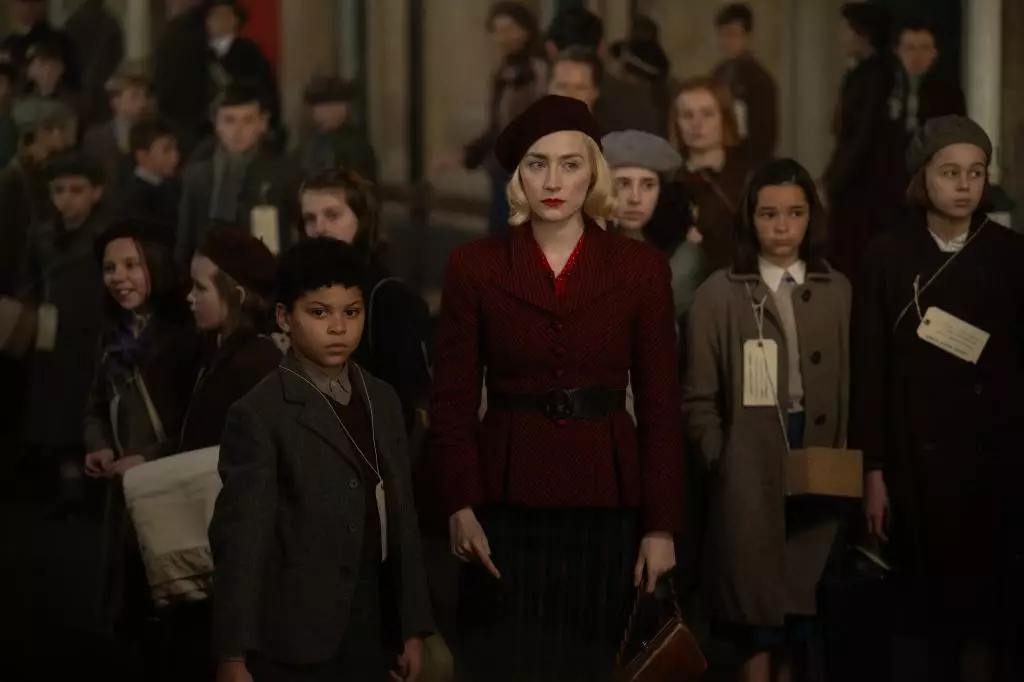The cinematic exploration of historical conflicts often serves as a medium for deeper reflections on humanity, survival, and loss. Steve McQueen’s latest narrative feature, *Blitz*, emerges as a poignant portrayal of the grim reality during the Nazi Blitzkrieg in London, all intricately seen through the innocent lens of a child. Following his widely acclaimed documentary, *Occupied City*, McQueen’s return to a war-torn setting offers viewers a visceral and emotional journey through the eyes of young George, played by newcomer Elliot Heffernan.
Set against the backdrop of a city in peril, *Blitz* begins in the tumultuous months between September 1940 and May 1941. The film opens with a gripping bombing sequence that serves as an unsettling reminder of the horrors of war. Unlike many previous portrayals, which often edge towards sensationalism or gloss over the brutal realities, McQueen’s storytelling is measured. He skillfully employs artful visuals that illustrate the slow, menacing descent of bombs, allowing viewers to grasp the gravity of the destruction before following the resolute firefighters who brave the chaos. This approach sets a somber tone, emphasizing the film’s emotional core.
At the center of this narrative is George, a biracial boy navigating the complexities of his identity during a catastrophic time. Living in a cramped apartment with his mother, Rita (Saoirse Ronan), and his grandfather, Gerald (Paul Weller), George represents the innocent victims of war. His biracial heritage adds layers to his struggles, particularly in a society steeped in racial homogeneity and prejudice. McQueen does not shy away from the challenges George faces; previously bullied for his background, he is thrust into a scenario that forces him into even greater risks as war looms overhead.
As the adults in George’s life make the decision to send him away to a safe location, the audience witnesses his internal turmoil. The act of separation—a common theme in war narratives—affects him deeply, revealing the harsh realities of young lives disrupted by conflict. In a moment of desperation, George jumps off a train bound for safety, setting in motion a series of events that will unveil the dangers and harshness of his world.
George’s journey through bombed-out London is marked by encounters with a spectrum of characters, each representing different sides of humanity in crisis. Among them is Ife (Benjamin Clementine), a character who embodies compassion amidst turmoil. This relationship hints at the importance of community and solidarity, even in the depths of despair. In stark contrast, George falls in with a gang of looters led by Albert (Stephen Graham), which underscores the moral ambiguities that war often brings out in individuals.
McQueen’s choice to weave a Dickensian narrative structure into *Blitz* is particularly striking. George’s experiences mirror those of Oliver Twist, as he navigates a world filled with both deceit and camaraderie. As he encounters corrupt figures and finds himself deceived and endangered in the name of survival, viewers are reminded of the stark choices individuals must make in wartime—choices that often force them into morally ambiguous territories.
What sets *Blitz* apart from others in the genre is McQueen’s meticulous direction and the formidable craftsmanship behind the scenes. Collaborating with talents such as cinematographer Yorick Le Saux and production designer Adam Stockhausen, McQueen conjures a vivid representation of a city under siege. The sharp contrasts between the vibrant scene inside a nightclub and the devastating reality outside create a powerful juxtaposition that enhances the film’s emotional weight.
Furthermore, the musical score by Hans Zimmer resonates deeply, enhancing the viewer’s connection with the characters’ plight. Each note not only traces George’s painful journey but also echoes the larger narrative of wartime resilience. The soundtrack serves as a haunting reminder of both loss and hope, encapsulating the core themes of the film.
*Blitz* not only transports viewers to the past but also compels them to reflect on today’s world, marked by ongoing conflicts in various regions. McQueen’s inspiration came from a photograph of a young Black boy standing alone during the Blitz, and seeing this figure in connection with modern dilemmas of displaced children adds resonance and gravity to the story. As the film sheds light on the tragedies of war, it simultaneously serves as a reminder of the recurring patterns of history.
McQueen’s *Blitz* is a masterful exploration of childhood innocence amidst the horrors of war, exhibiting the interwoven complexities of identity, survival, and morality. As George embarks on a turbulent journey back home, so too does the audience embark on a powerful emotional odyssey—one that resonates well beyond the credits roll.


Leave a Reply